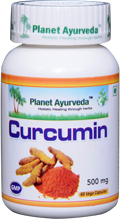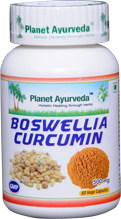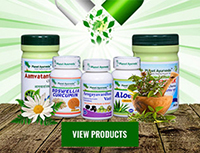Curcumin pharmacologyThe research indicates that extracts of Curcuma longa exhibit anti-inflammatory activity after parental application in standard animal models used for testing anti-inflammatory activity. It turned out that curcumin and the volatile oil are at least in part responsible for this action. It appears that when given orally, curcumin is far less active than after i.p. administration. This may be due to poor absorption, as discussed. Data on histamine-induced ulcers are controversial, and studies on the secretory activity (HCl, pepsinogen) are still lacking. In vitro, curcumin exhibited antispasmodic activity. Since there was a protective effect of extracts of Curcuma longa on the liver and a stimulation of bile secretion in animals, Curcuma longa has been advocated for use in liver disorders. Evidence for an effect on liver disease in humans is not yet available. From the facts that after oral application only traces of curcumin were found in the blood and that, on the other hand, most of the curcumin is excreted via the faeces it may be concluded that curcumin is absorbed poorly by the gastrointestinal tract and/or underlies presystemic transformation. Systemic effects therefore seem to be questionable after oral application except that they occur at very low concentrations of curcumin. This does not exclude a local action in the gastrointestinal tract. Curcumin (diferuloylmethane) is a polyphenol derived from the plant Curcuma longa, commonly called turmeric. Wide research over the last 50 years has indicated this polyphenol can both avoid and treat cancer. The anticancer potential of curcumin stems from its capability to hold back propagation of a wide diversity of tumour cells, down-regulate transcription factors NF-kappa B, AP-1 and Egr-1; down-regulate the expression of COX2, LOX, NOS, MMP-9, uPA, TNF, chemokines, cell surface adhesion molecules and cyclin D1; down-regulate growth factor receptors (such as EGFR and HER2); and inhibit the activity of c-Jun N-terminal kinase, protein tyrosine kinases and protein serine/threonine kinases. In several systems, curcumin has been described as a potent antioxidant and anti-inflammatory agent. Evidence has also been presented to suggest that curcumin can suppress tumour commencement, promotion and metastasis. Pharmacologically, curcumin has been found to be safe. Human clinical trials indicated no dose-limiting toxicity when administered at doses up to 10 g/day. All of these studies suggest that curcumin has enormous potential in the prevention and therapy of cancer. The current review describes in detail the data supporting these studies. Natural curcuminoids, curcumin, I, II and III inaccessible from turmeric (Curcuma longa) were compared for their cytotoxic, tumour plummeting and antioxidant activities. Curcumin III was found to be more active than the other two as a cytotoxic agent and in the reserve of Ehrlich ascites tumour in mice-research. These compounds were also checked for their antioxidant activity which possibly indicates their potential use as anti-promoters. The amount of curcuminoids (I, II and III) needed for 50% inhibition of lipid peroxidation was 20, 14 and 11 g/m. Concentrations needed for 50% inhibition of superoxides were 6.25, 4.25 and 1.9 micrograms/ml and those for hydroxyl radical were 2.3, 1.8 and 1.8 micrograms/ml, respectively. The ability of these compounds to restrain the superoxide production by macrophages activated with phorbol-12-myristate-13-acetate (PMA) indicated that all the three curcuminoids inhibited superoxide production and curcumin III produced maximum effect. These results indicate that curcumin III is the most active of the curcuminoids present in turmeric. Synthetic curcumin I and III had similar activity to natural curcumins.
Indications of Curcumin Capsules
PRODUCT
 OUR CURCUMIN CAPSULES
Planet Ayurveda Curcumin gives the best results than the other similar supplements from other companies. The reason is that we use standardized 500 mg extract of curcumin containing 95 % curcuminoids in pure vegetarian capsule shells.
Serving Size- 1-2 Vegi Cap
Servings Per Container - 30 to 60 Each 500 mg Capsule Contains – Best Quality Herbal standardized Extract of Curcumin 10:1 (containing 95% curcuminoids) WE SELL THE BEST QUALITY CURCUMIN CAPSULES IN THE WORLD - TRY THEM !
Dosage of Curcumin Capsules2 capsules twice daily, with plain water after meals for inflammation. 3-4 capsules can be consumed in case of various cancer. 1 capsule twice daily is good as natural anti-oxidant.
Our curcumin capsules contain 100 % herbal extract of standardized curcumin extract upto 95 % curcuminoids and we do not fill any powders, fillers or herbs. We use pure vegetarian shells and not hard gelatin shells. |









